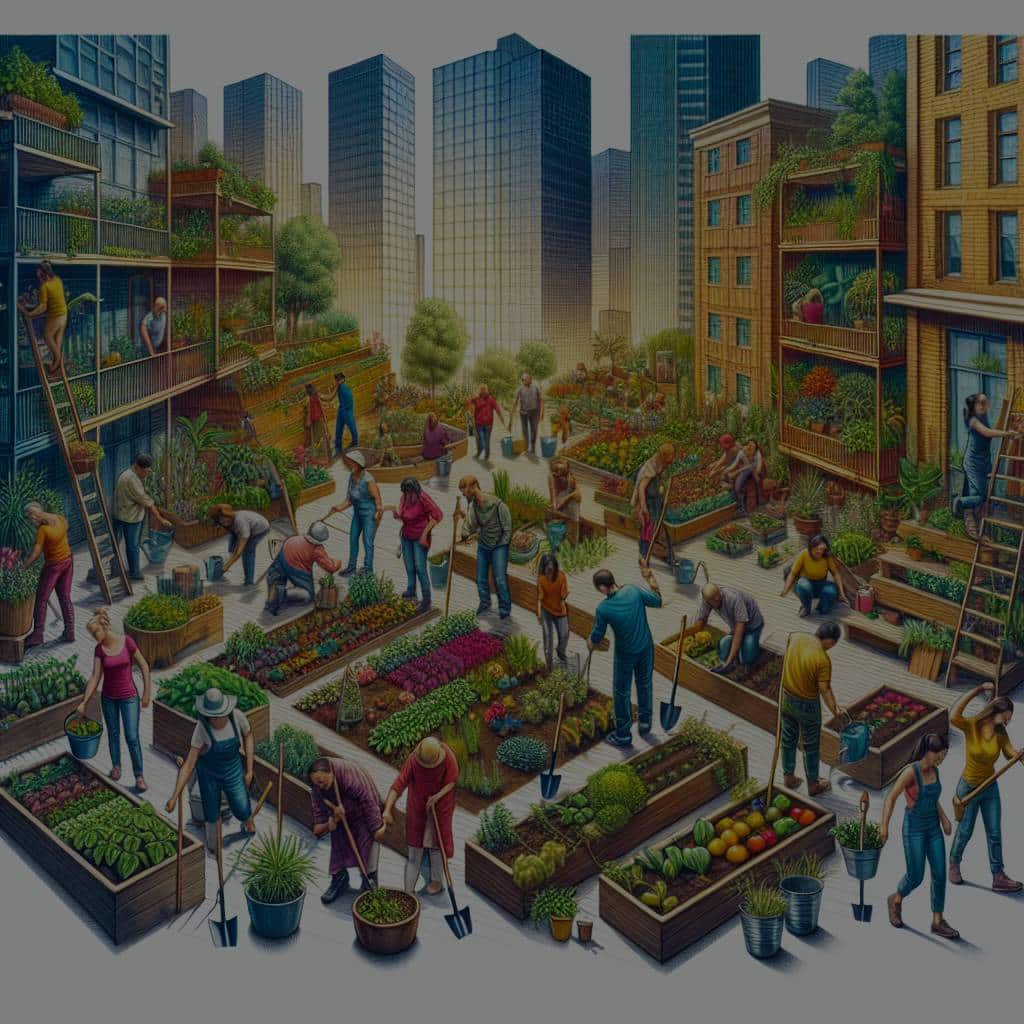What Are the Psychosocial Benefits of Engaging in Cooperative Urban Gardening?

In the hustle and bustle of urban life, the idea of finding tranquility and solace in a concrete jungle can often seem far-fetched. But in the heart of our bustling cities, an innovative, community-based approach to wellness is gaining traction — cooperative urban gardening. These communal spaces are not just spots to grow food; they are vibrant hubs for social interaction, learning, and personal growth. By exploring numerous studies from reputed sources like Google Scholar and Crossref, we’ll delve into the psychosocial benefits that urban gardening brings to its participants.
Urban Gardens: A Group Effort
Sowing seeds in an urban garden is an exercise in group cohesion. The very nature of these spaces demands collective participation, where each member contributes to the shared goal of cultivating a thriving, productive garden.
This might interest you : Can Forest Bathing (Shinrin-Yoku) Be an Effective Treatment for Seasonal Affective Disorder?
Urban gardens can encourage various forms of social interaction. Gardeners, working side-by-side in the shared space, naturally foster a sense of community, potentially bridging the gaps between different demographics within the urban environment. According to a study published on Google Scholar, participants of urban gardens were found to have higher levels of social capital, demonstrating the gardens’ role in enhancing social networks.
Working in a group also promotes shared learning experiences. As gardeners exchange tips, tricks, and knowledge about gardening practices, they contribute to a collective pool of information, fostering a culture of continuous learning and mutual mentoring.
In the same genre : How Can Low-Impact Aquatic Exercises Improve Health in Individuals with Osteoarthritis?
The Health Benefits: Beyond Physical Well-being
Indeed, the health benefits of urban gardening extend far beyond physical well-being. While the activity undeniably promotes fitness and provides access to fresh, nutritious food, its impact on mental health has been gaining recognition in recent years.
Studies have shown that time spent in nature, even within an urban context, can promote relaxation and reduce stress levels. According to a study referenced on Crossref, urban gardeners reported lower stress levels and higher mood levels than their non-gardening counterparts.
Furthermore, urban gardening appears to boost self-esteem and overall happiness. Seeing a seed sprout into a plant, and eventually yield produce, can instill a sense of accomplishment and satisfaction, enhancing a person’s self-worth.
Urban Gardens as Spaces of Empowerment
Urban gardens can be transformative spaces that empower individuals and communities. As a participatory approach to urban improvement, these gardens enable residents to reclaim and beautify underutilized urban spaces, thereby increasing community pride and a sense of ownership.
Being a part of this transformation process can empower participants, giving them a sense of control and influence over their immediate environment. For instance, a Google Scholar study highlighted how participation in urban gardens improved residents’ perceptions of their neighborhoods, leading to increased community satisfaction.
Furthermore, urban gardens can serve as platforms for social activism and community engagement, providing a space for residents to voice their concerns, mobilize resources, and collectively advocate for improved urban living conditions.
Food Sovereignty and Security
Urban gardens can play a crucial role in promoting food sovereignty and security among urban residents. The concept of food sovereignty involves the right of individuals and communities to define their own food and agriculture systems.
By cultivating their own food, urban gardeners can assert control over what they consume, promoting healthier dietary habits while reducing dependence on commercially grown produce. Moreover, these gardens can serve as a buffer during times of food scarcity, offering a reliable source of fresh produce right at one’s doorstep.
In conclusion, cooperative urban gardening offers a multitude of psychosocial benefits. By fostering community interaction, promoting mental well-being, empowering residents, and enhancing food sovereignty, these spaces hold immense potential to improve the quality of urban living. As cities continue to grow and evolve, urban gardens offer an innovative, sustainable way forward for urban wellness and community development.
Impact of Urban Gardening on Personal Growth and Development
Urban gardens, as a microcosm of the wider community, provide ample opportunities for personal growth and development. As per a systematic review found on Google Scholar, individuals who participate in community garden activities tend to showcase improved self-confidence, leadership skills, and overall personal development.
The consistent participation in gardening tasks, from tending to plants to managing pests, serves as a conduit for developing problem-solving skills, perseverance, and a sense of responsibility. The feeling of accomplishment when harvesting the fruits of one’s labor not only boosts self-esteem but also cultivates a positive self-image, as supported by research published on CrossrefExternal icon.
Consequently, this increase in personal self-worth and competence often translates into improved mental health. The act of nurturing a plant aids in managing feelings of anxiety or depression, thus promoting psychological resilience. The soothing nature of the garden environment coupled with the physical activity involved in gardening has been shown to effectively reduce perceived stress, creating a sense of calm and tranquility.
Moreover, the inclusive nature of community gardening fosters an environment where individuals are respected, accepted, and valued, providing a positive impact on one’s sense of belonging and social identity.
The Role of Urban Gardens in Public Health
Urban gardens can be a powerful tool in promoting public health. The availability of fresh, home-grown produce not only ensures a supply of nutritious food but also encourages healthier eating habits. A study referenced on PubMedExternal icon revealed that community gardeners consume more fruits and vegetables compared to non-gardeners, thereby enforcing dietary patterns beneficial to health.
The physical activity associated with gardening further contributes to overall health. By providing a fun and engaging way to get moving, urban gardens can play a crucial role in combating obesity and sedentary lifestyles common in urban settings. The health and well-being benefits gained from gardening activities extend beyond the gardeners themselves. Through the sharing of homegrown produce, the health benefits ripple out to families and the wider community.
Lastly, urban gardens serve as green spaces that improve the overall living environment. They contribute to reducing urban heat, improving air quality, and providing habitats for urban wildlife, aligning with broader public health goals of creating sustainable and livable cities.
Conclusion: Embracing the Potential of Urban Gardens
Urban gardens, in fostering a sense of community and enhancing quality of life, represent a potent tool for individual and societal well-being. The psychosocial benefits – from improved mental health to personal growth, alongside the tangible health benefits – attest to the transformative power of these green spaces. By promoting healthier lifestyles and creating opportunities for social bonding, urban agriculture serves as a catalyst in building resilient communities and sustainable cities.
The continued growth of cities underscores the need for innovative, adaptable solutions like urban gardens. As evidenced by numerous studies on Google Scholar, CrossrefExternal icon, and PubMedExternal icon, the potential of community gardens in fostering positive change is immense. From the individual to the community level, the benefits community gardens offer are worth exploring and investing in, painting a promising picture for the future of urban living.
